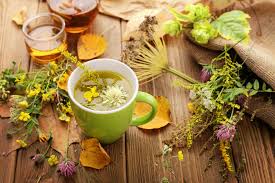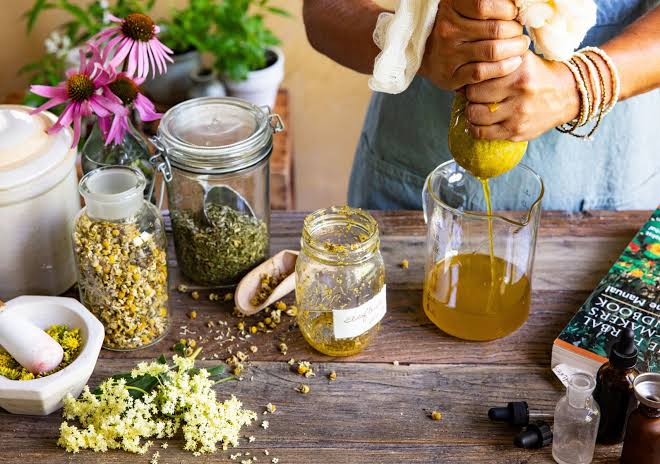Herbalism is an ancient practice that involves the use of plants and their extracts for medicinal, therapeutic, and wellness purposes. It is a natural and holistic approach to healing that has been passed down through generations, dating back to ancient civilizations. In simple terms, herbalism is the art and science of using herbs to promote health and well-being.
Herbs, in this context, refer to plants or plant parts like leaves, roots, flowers, and seeds that have medicinal properties. These plants have been used for centuries by various cultures around the world for their healing benefits. What makes herbalism so compelling is its accessibility and affordability. Many of these herbs can be grown in gardens or easily found in nature, making them a practical option for those seeking alternative remedies.
The practice of herbalism is based on the belief that nature provides us with everything we need to maintain good health and treat common ailments. Herbalists, individuals who practice herbalism, have a deep understanding of these plants and their therapeutic properties. They often gather, prepare, and administer herbs in various forms, such as teas, tinctures, salves, or capsules.
One of the fundamental principles of herbalism is the concept of using the whole plant. This means that herbalists prefer to utilize the entire plant rather than isolating specific compounds. They believe that the synergy of all the plant’s components provides a more balanced and effective treatment. For example, when making a tea from chamomile flowers, herbalists use the entire flower head to capture the full range of beneficial compounds.
Herbalism is not a one-size-fits-all approach. It takes into account an individual’s unique constitution and specific health needs. Herbalists often conduct thorough consultations to understand a person’s health history, lifestyle, and current symptoms before recommending an herbal remedy. This personalized approach is one of the strengths of herbalism, as it acknowledges that each person’s body is different and may respond differently to herbal treatments.
The benefits of herbalism extend beyond physical health. Many herbalists also recognize the connection between mental and emotional well-being and the use of herbs. Some herbs, like lavender and valerian, are known for their calming and stress-relieving properties. Herbalists often recommend these herbs to support emotional balance and reduce anxiety.
It’s important to note that while herbalism offers many advantages, it is not a replacement for conventional medical care when needed. Herbalists typically work in conjunction with medical professionals to ensure the best possible care for their clients. They view herbal remedies as complementary to, rather than a replacement for, modern medicine.
In recent years, there has been a resurgence of interest in herbalism as people seek natural alternatives to pharmaceuticals and synthetic products. This revival has led to an increased demand for herbal education and a growing community of herbal enthusiasts. Many individuals are now learning the art of herbalism to take charge of their own health and well-being.
However, herbalism is a centuries-old practice that harnesses the power of plants to promote health and healing. Its simplicity and connection to nature make it an attractive option for those looking for holistic and natural approaches to wellness. Whether used to soothe a sore throat, alleviate stress, or support overall vitality, herbalism continues to be a valuable resource for individuals seeking balance and harmony in their lives.
Read Also: Wild African Dogs Description and Care Guide
Herbal Remedy

Herbal remedies are natural solutions for various health issues that rely on the healing properties of plants and herbs. These remedies have been used for centuries by different cultures worldwide to address a wide range of ailments and conditions. Unlike pharmaceutical drugs, which are often synthesized in laboratories, herbal remedies utilize the power of nature to promote health and well-being.
The use of herbal remedies is rooted in the practice of herbalism, as discussed in the previous section. Herbalists and individuals knowledgeable about herbs have traditionally prepared and administered these remedies.
Here are some common herbal remedies and their applications:
1. Chamomile Tea: Chamomile tea is well-known for its calming and soothing properties. It is often used to alleviate stress, anxiety, and sleep disturbances. Chamomile can also help with digestive issues, such as indigestion and upset stomach.
2. Echinacea: Echinacea is a popular herbal remedy for boosting the immune system. It is commonly used to prevent or reduce the severity and duration of colds and upper respiratory infections.
3. Ginger: Ginger is an excellent remedy for nausea, motion sickness, and morning sickness during pregnancy. It also has anti-inflammatory properties and can be used for joint pain and muscle soreness.
4. Peppermint Oil: Peppermint oil is used to relieve headaches, soothe digestive discomfort, and alleviate symptoms of irritable bowel syndrome (IBS). When applied topically, it can also provide relief from muscle aches.
5. Garlic: Garlic is known for its antibacterial and antiviral properties. It is often used to support the immune system and combat infections. Additionally, garlic may help lower blood pressure and reduce the risk of heart disease.
6. Lavender Essential Oil: Lavender essential oil is a popular remedy for promoting relaxation and reducing stress and anxiety. It can be used in aromatherapy, added to bathwater, or applied topically (diluted) to calm the mind and improve sleep quality.
7. Turmeric: Turmeric contains a compound called curcumin, which has powerful anti-inflammatory and antioxidant properties. It is used to manage joint pain, arthritis, and inflammation-related conditions.
8. Aloe Vera: Aloe vera gel is renowned for its soothing and healing properties for skin issues such as sunburns, minor burns, and skin irritations. It can also be taken internally to support digestive health.
9. St. John’s Wort: St. John’s Wort is used as a natural remedy for mild to moderate depression and mood disorders. It may help improve mood and reduce feelings of sadness.
10. Valerian Root: Valerian root is often used to address insomnia and improve sleep quality. It has a sedative effect and can help individuals relax and fall asleep more easily.
It is very important to approach herbal remedies with caution and, if necessary, consult with a healthcare professional or herbalist, especially if you have underlying health conditions, are pregnant, or are taking medications. While herbal remedies can be safe and effective, proper dosage and usage are essential to ensure their benefits and minimize potential side effects.
In addition, herbal remedies offer a natural and time-tested approach to health and wellness, utilizing the healing properties of plants and herbs to address a variety of physical and emotional concerns. When used wisely and responsibly, these remedies can be valuable additions to a holistic approach to well-being.
Herbal Supplements

Herbal supplements are natural products made from plant extracts, herbs, or botanicals. They are available in various forms, including capsules, tablets, powders, tinctures, and teas. These supplements are intended to complement one’s diet and provide additional nutrients, promote health, or address specific health concerns. Herbal supplements have gained popularity as individuals seek alternative and natural ways to support their well-being.
Here are some key points about herbal supplements you need to know:
1. Natural Origins: Herbal supplements are derived from a wide range of plants, including herbs, roots, leaves, flowers, and fruits. Common examples include ginseng, echinacea, garlic, and turmeric.
2. Nutritional Support: Many herbal supplements are rich in vitamins, minerals, and antioxidants, which can contribute to overall health. For example, spirulina is a supplement derived from blue-green algae known for its nutrient content.
3. Traditional Medicine: Herbal supplements often draw on traditional healing systems from various cultures, such as Traditional Chinese Medicine (TCM) or Ayurveda. These systems have used herbs for centuries to promote health and balance.
4. Specific Health Benefits: Different herbal supplements are believed to offer specific health benefits. For instance, milk thistle is used to support liver health, while saw palmetto may be used for prostate health in men. Herbal supplements are often favored by individuals who prefer a holistic approach to health. They view these supplements as a way to support the body’s natural healing processes.
5. Safety Considerations: While herbal supplements are generally considered safe when used as directed, it’s essential to be aware of potential interactions with medications and possible side effects. Consulting with a healthcare professional is advisable, especially if you have underlying health conditions or are taking prescription medications.
6. Quality and Regulation: The quality of herbal supplements can vary widely among brands. Look for supplements from reputable manufacturers that follow good manufacturing practices (GMP). Some countries have regulations governing the production and labeling of herbal supplements to ensure safety and quality.
7. Personalized Approach: Like herbalism itself, the use of herbal supplements can be personalized. What works well for one person may not have the same effect on another. It’s essential to listen to your body and adjust your supplement regimen accordingly.
8. Research and Evidence: Scientific research on the efficacy and safety of herbal supplements continues to evolve. Some supplements have a substantial body of research supporting their benefits, while others may have limited evidence. Staying informed and keeping up with current research is essential.
9. Balanced Diet: Herbal supplements should not be seen as a replacement for a balanced diet. They are intended to complement your dietary intake and lifestyle choices.
Additionally, herbal supplements offer a natural and often culturally rooted approach to supporting health and well-being. They can be a valuable part of a holistic health regimen when used responsibly and in conjunction with a healthy lifestyle. However, it’s crucial to exercise caution, seek professional guidance when needed, and make informed choices when selecting and using herbal supplements.
Read Also: Wild Boar Description and Complete Care Guide
Herbal Clean Detox

Herbal Clean Detox is a brand of dietary supplements and detoxification products that are marketed to assist individuals in cleansing their bodies of toxins and impurities. These products are often used by people who want to prepare for a drug test, promote general well-being, or support their body’s natural detoxification processes.
It is important to note that the effectiveness of such products can vary, and their use should be approached with caution and an understanding of their limitations.
Below are some key points to consider regarding Herbal Clean Detox:
1. Detoxification: Herbal Clean Detox products are designed to support the body’s natural detoxification systems, primarily focusing on the elimination of toxins from the urinary system. These products often claim to flush out impurities from the body.
2. Variety of Products: Herbal Clean offers a range of detox products, including detox drinks, capsules, and kits. These products may contain a combination of herbs, vitamins, minerals, and other ingredients thought to aid in the detox process.
3. Usage and Instructions: The usage instructions for Herbal Clean Detox products typically involve consuming the product as directed, often in combination with increased water intake and temporary dietary modifications. Following the instructions closely is important to achieve the desired results.
4. Drug Testing: Some individuals use Herbal Clean Detox products in an attempt to pass drug tests, such as urine tests. These products are not guaranteed to work, and their efficacy can vary based on factors like the specific drug being tested for, the individual’s metabolism, and the timing of product use relative to the test.
5. Temporary Solution: Herbal Clean Detox products are intended for temporary use and are not a long-term solution for health or detoxification. They should not be relied upon as a way to maintain ongoing health or as a substitute for a healthy lifestyle.
6. Safety and Quality: As with any dietary supplement, it’s essential to choose products from reputable manufacturers. Ensuring the safety and quality of the ingredients used in these products is crucial.
7. Consultation: If you are considering using a detox product, it’s advisable to consult with a healthcare professional before starting any detox regimen, especially if you have underlying health conditions or are taking medications.
8. Healthy Lifestyle: Detox products, including those from Herbal Clean Detox, are most effective when used in conjunction with a healthy lifestyle that includes a balanced diet, regular physical activity, and adequate hydration.
Herbal Clean Detox offers a range of products aimed at supporting detoxification processes in the body. These products are marketed for various purposes, including passing drug tests and promoting general well-being. However, their effectiveness can vary, and they should be used with caution and in accordance with the provided instructions. It is very important maintain a balanced and healthy lifestyle as the foundation of long-term well-being and to consult with a healthcare professional when necessary.
Herbal Pharmacy
A herbal pharmacy, often referred to as an herbal apothecary or herbalist’s dispensary, is a place where various herbal remedies, medicines, and natural health products are prepared, dispensed, and sometimes even sold. This establishment is typically run by herbalists, naturopathic practitioners, or individuals with a deep knowledge of herbs and their applications. A herbal pharmacy serves as a hub for herbal medicine, where plant-based remedies are customized to address specific health needs.
Here are key things of a herbal pharmacy you need to know:
1. Herb Selection: A herbal pharmacy stocks a wide range of dried herbs, herbal extracts, tinctures, essential oils, and other botanical substances. These herbs are carefully selected based on their therapeutic properties and traditional uses.
2. Herbal Preparations: Herbalists and herbal practitioners often prepare their own herbal remedies from raw herbs available in the pharmacy. These preparations can include herbal teas, tinctures, salves, creams, and capsules, among others.
3. Customization: One of the unique aspects of a herbal pharmacy is its ability to customize herbal remedies. Herbalists can blend herbs to create personalized formulations tailored to an individual’s specific health concerns and constitution.
4. Consultation: Many herbal pharmacies offer consultation services. Clients can meet with herbalists or practitioners to discuss their health issues and receive personalized herbal recommendations. This ensures that the herbal remedies chosen are well-suited to the individual’s needs.
5. Education: Herbal pharmacies often provide educational resources, including books, pamphlets, and workshops, to help clients and the public learn more about herbal medicine, its benefits, and safe usage.
6. Quality Assurance: Reputable herbal pharmacies prioritize the quality of their products. They may source herbs from trusted suppliers, adhere to good manufacturing practices, and conduct quality control tests to ensure the safety and efficacy of their products.
7. Traditional and Modern Medicine: Herbal pharmacies bridge the gap between traditional herbal medicine and modern healthcare. They may work in conjunction with healthcare professionals to provide complementary support to individuals seeking natural remedies.
8. Community Engagement: Some herbal pharmacies are actively involved in their communities, hosting events, workshops, and wellness programs to promote the use of herbal medicine and holistic health practices.
9. Safety and Ethics: Herbalists and practitioners in herbal pharmacies emphasize ethical sourcing of herbs and responsible herbal medicine practices. They prioritize the safety and well-being of their clients.
10. Regulation: The regulation of herbal pharmacies can vary by region and country. In some places, herbalists and herbal products are subject to specific regulations and licensing requirements.
In summary, a herbal pharmacy is a valuable resource for individuals seeking natural and plant-based remedies to support their health and well-being. It combines traditional knowledge of herbal medicine with modern practices to provide customized herbal solutions. When used responsibly and in consultation with qualified practitioners, herbal remedies from a herbal pharmacy can be a complementary and holistic approach to healthcare.
Read Also: A Guide to Environmental Engineering

